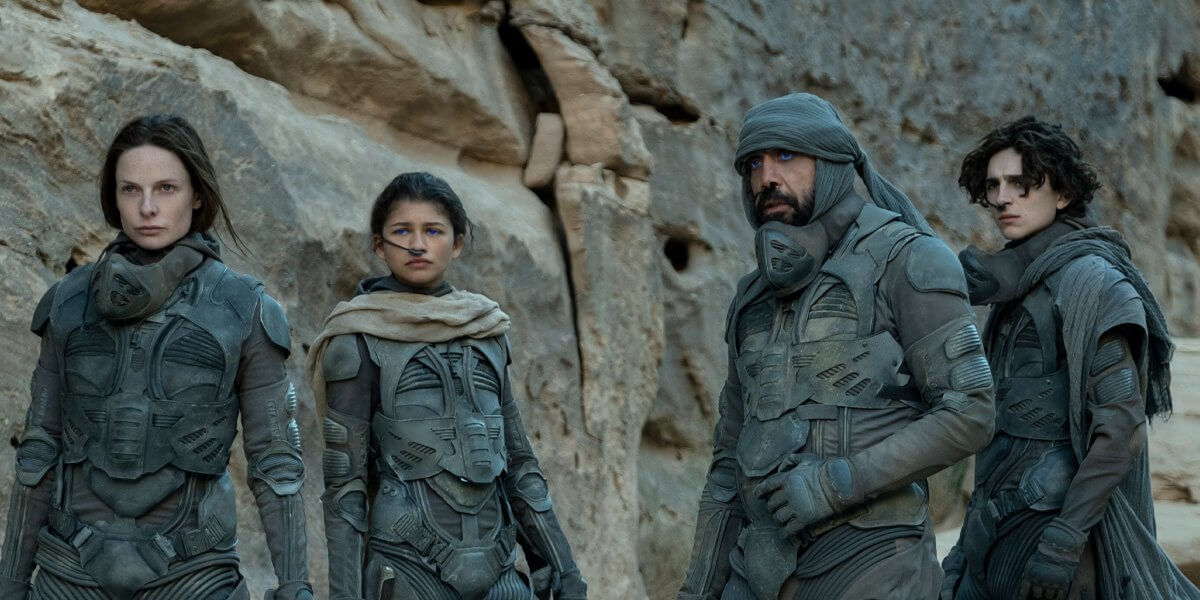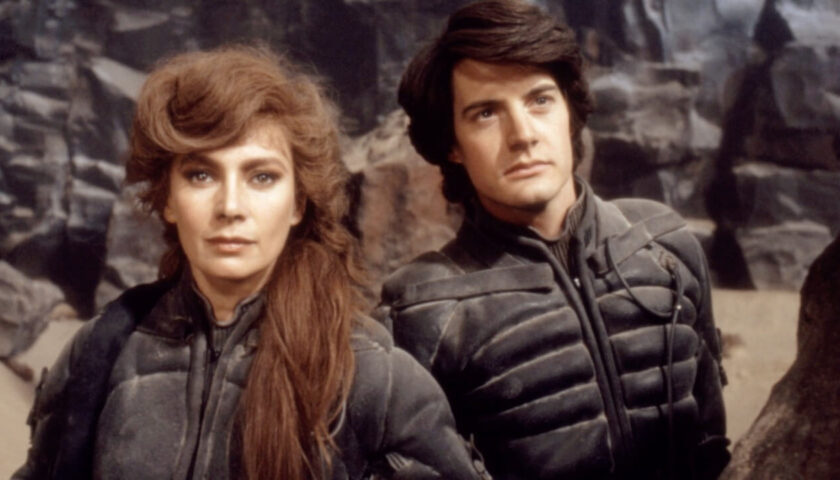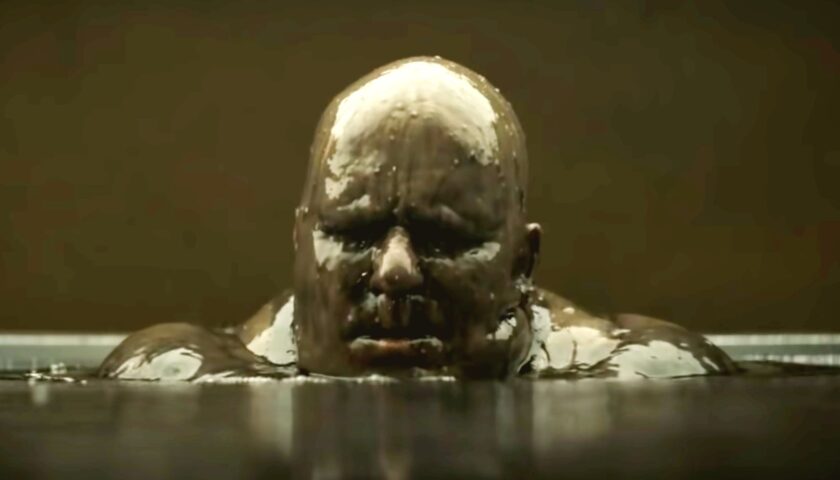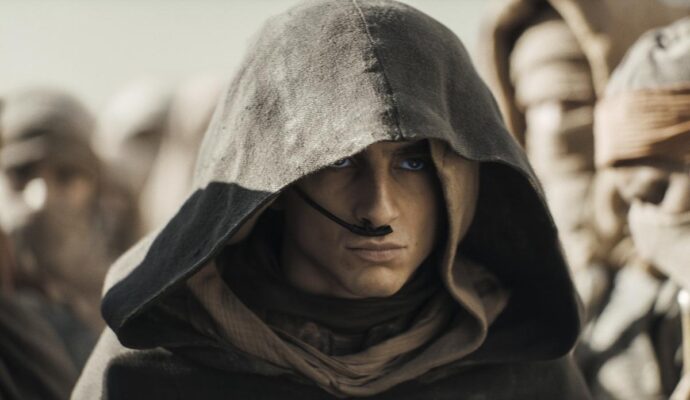“Dune” (2021) – “My desert. My Arrakis. My Dune.” – Baron Vladimir Harkonnen (Stellan Skarsgard)
The 2021 film adaptation of Frank Herbert’s seminal 1965 science-fiction novel is Denis Villeneuve’s “Dune”.
The man proudly sports a resume bursting with provocative titles, including “Polytechnique” (2009), “Incendies” (2010), “Prisoners” (2013), “Enemy” (2013), “Sicario” (2015), and “Arrival” (2016). He also bravely helmed the unthinkable, a “Blade Runner” sequel with “Blade Runner 2049” (2017).
Ridley Scott (who directed the original “Blade Runner”) and Villeneuve were probably the most trusted directors to oversee such an undertaking at the time by staying true to the first movie and Philip K. Dick’s novel “Do Androids Dream of Electric Sheep?” and also extending the universe further into some unknown through line. David Cronenberg may have been a third, but his films excel in small, narrow spaces. Broad, sweeping epics are not his specialty. Then again, look at arthouse director Chloe Zhao’s leap into the gigantic MCU undertaking “Eternals” (2021), although this critic hasn’t yet seen that movie. Well, Villeneuve wasn’t a big-budget filmmaker in the beginning either, and “Sicario” and “Arrival” have two of the most haunting third acts in 21st-century cinema.
The point is that Villeneuve is a gifted and proven director, and like “Blade Runner 2049”, he’s one of the few individuals who could embrace a new, big-screen version of Herbert’s novel.
Decades ago, Alejandro Jodorowsky passionately attempted a “Dune” film, but the project folded (and by the way, see the extraordinary documentary “Jodorowsky’s Dune” (2013) to learn his story).
David Lynch famously brought his “Dune” vision to the screen in 1984. For those who haven’t read the book – including this critic – the 137-minute movie is a bizarre collection of characters, sets, endless references of spice, and constant internal dialogues that serve as narration. Frankly, the voiceovers are probably needed to help escort novice viewers.
As a side note, Princess Irulan’s (Virginia Madsen) opening introduction is vastly helpful.
Lynch’s film landed just a year after the enormously celebrated “Return of the Jedi” (1983), the conclusion of George Lucas’ first trilogy. General movie audiences were hungry for new swashbuckling sci-fi, but “Dune” was not it, as the movie feels like Cronenberg’s “Naked Lunch” (1991) meets an outer space acid trip.
Yes, another Cronenberg mention, and Jodorowsky said he wanted his “Dune” to be “a film that gives LSD hallucinations without taking LSD.” In other words, the aforementioned analogy fits.
(Note: Director John Harrison also made “Frank Herbert’s Dune” (2000), a 4-hour 25-minute mini-series for television, but I have not seen it.)
Well, here we are on Earth in 2021, 56 years after Herbert’s novel, 37 after Lynch’s film, 21 after Harrison’s mini-series, and one year after a COVID-19 delay, Villeneuve’s “Dune” arrives in theatres and HBO Max.
What’s the verdict?

“Dune” is profoundly procedural. The film has pacing issues, and it will spur some sincere questions about its logic. On the other hand, this 165 million dollar celluloid creation offers a spectacular visual experience that plucks moviegoers from their daily physical and emotional chores, work emails, family responsibilities, constant social media messaging, COVID fears, and consumer-driven pressures to an unfamiliar, otherworldly place.
Accustomed and everyday rules don’t apply.
The year is 10191.
A substance dubbed spice is the most coveted commodity in the universe because it’s essential for interstellar travel. Spice – also named Spice Melange – is only found on one planet, Arrakis, a desolate, desert rock where scorching temperatures fall between unbearable and unlivable. If that wasn’t rough enough, giant human-sucking worms – that are a couple of hundred yards long – could rumble from the sand and swallow you up in one bite.
The Freman (who live below the surface) live on Arrakis, and the dark orange spice – which looks like sand – seems to be everywhere. Hey, Arrakis has plenty of beaches, but leave your surfboards at home. You won’t find an ocean, but the spice turns the Freman people’s eyes aqua blue.
Duke Leto Atreides (Oscar Isaac), his wife Lady Jessica (Rebecca Ferguson), and their son Paul (Timothee Chalamet) live on Caladan, a lush green and blue planet, and they found a nice spot to plant their roots. Think Dana Point, Calif. meets the Scottish Highlands. This royal family enjoys a large military, spaceships, and all sorts of creature comforts. The men wear dapper, stylish peacoats, and the women sometimes don black goth hoods that Darth Sidious (from “Star Wars”) would emphatically endorse. On other occasions, they sport ceremonial garb with 20 yards of flowing flamboyant scarves that Lady Gaga would die for. Life couldn’t be better for the Duke, Lady Jessica, and Paul, but the Emperor requests that The House of Atreides move to Arrakis and take over spice mining from the House Harkonnen.
Baron Vladimir Harkonnen – the HH leader – is an overweight, malevolent albino creep who bathes in a weirdo tarpit, and his loyal subjects and soldiers wear black. Sure, the Baron won’t mind that the good Duke and The House of Atreides will oversee and collect the most crucial ingredient in the universe.
What could go wrong?
Oh, one other thing, Paul has a supercharged ESP. He’s training to use his “voice”, which will command others to follow his instructions blindly. It pseudo-works like The Force (again, from “Star Wars”), but he also sees haunting premonitions, including visions of a Freman woman (Zendaya) he never met.
There you have it.
Including the Emperor’s folks, the movie features four groups of people embroiled in an intergalactic story of capitalism, contracts, and colonialism. The film is a political chess game, albeit with just one or two moves stretching over 155 minutes. Politics, finance, and operations capture the forefront, while Paul’s journey towards enlightenment hovers just below.
Massive stakes are in play, and to wholly embrace them, Villeneuve divided the book into two parts. This film is only Part One, and compared to Lynch’s crowded, sometimes kinetic effort, Villeneuve gives his version time to let the narrative breathe.
The endpoint of his 2-hour 35-minute picture lands at 1984 movie’s 1-hour 28-minute mark. We march at a leisurely pace in 2021.
Here are a few examples that help stretch out the film:
Paul contemplates his future alone in his room on more than one occasion.
Sweeping, ceremonial welcoming parties meet two spaceship landings.
Paul and Jessica occupy precious screen time scouring the desert in the third act.
Villeneuve bequeaths a golden opportunity for moviegoers to sit back and absorb it all, but he also offers space. Each room inside the featured compounds on Caladan and Arrakis might be 1,500 sq. ft. Could you imagine the real estate prices in the 102nd century?
Cinematographer Greg Fraser spends plenty of time outside on Arrakis and effectively captures the harsh brutality of the place. He and Villeneuve filmed in Jordan and the United Arab Emirates. It doesn’t feel like Paul and Lady Jessica are hiking all over a sound stage, and only a CGI mouse is their sole companion out in the Middle East.
The special effects are top-notch, especially during an explosive firefight that lights up the night sky, as the differences between 1984 technology and 2021 equate to an Atari 2600 and a Sony PlayStation PS5. There’s just no comparison, and fans of the novel and 1984 film will gratefully and gleefully welcome this movie’s visual joy and wonder.
If you decide to see Denis’ “Dune”, catch it on the big screen (if you feel safe in theatres) to live through the spectacle of it all, including Hans Zimmer’s rumbling score, which will vibrate your innards during a couple of scenes. That’s a good thing, I think.
What’s not so great is – sometimes – the music overshadows conversations, and a movie colleague commented after an October theatre screening that she’d rewatch the film on HBO Max with subtitles.
Smart thinking!
So, if you commit to “Dune” (2021), prepare to watch it twice. I’m sure diehard fans and brand new ones will pledge to see it many more times, but at least one viewing with subtitles is required.
“Dune: Part Two” is also required. Looking at the entire story, yes, Villeneuve landed on an appropriate spot to end Part One, but it’s still an unsatisfying and underwhelming one.
Unfortunately, with much need for exposition, “Dune” feels like a bureaucratic exercise or an experiment. Except for Jason Momoa’s Duncan Idaho, the entire film is devoid of any humor. Sure, that’s not the point with “Dune”, but the movie failed to trigger – at least from my perspective – any emotions (that weren’t special effects-driven), save for one first-act scene when Lady Jessica actively displays her alarm over Paul’s safety.
An all-star cast, including Isaac, Ferguson, Skarsgard, Momoa, Javier Bardem, Josh Brolin, Charlotte Rampling, David Dastmalchian, and Dave Bautista amply offer their capable services, and it’s pleasing to see so many admirable actors in this colossal project. Chalamet is a fine casting choice as Paul. Early in the first act, he’s briefly seen without his shirt, which will appease his adoring fans, but his slim appearance highlights Paul’s underdog vulnerability.
The 1984 film attracted considerable talent too. That’s a tribute to the directors and the source material. Herbert’s book was published in the mid-60s, so the man deserves heaping praise for his out-of-this-world vision.
Still, while watching “Dune” (2021), some random questions appear.
When the script stresses spice’s importance throughout the film, why do we only see brief glimpses of interstellar travel?
Why does Zimmer repeatedly include bothersome, screeching chants when sudden discoveries occur?
Why can Paul and Jessica sometimes stride normally in the desert but on other occasions, they perform a special walk to avoid the worms?
Why do Gurney (Brolin), Duncan (Momoa), and hundreds of others even bother turning on their shields when an enemy’s blade cuts right through the protection like a knife slicing a stick of warm butter?
Why are armies – in the year 10191 with the technology to build and fly spaceships and helicopters (that move like dragonflies) – using swords and knives during hand-to-hand combat?
These aren’t monumental points, but they may pull you out of the intended 2.5-hour trance.
Nonetheless, Villeneuve’s “Dune” is a stunning technological achievement, and millions and millions of fans will claim this film as their “Dune” too.
I’m sorry to report that it’s not this critic’s “Dune”, but neither was the 1984 movie. Oh well, plunk me on Arrakis with a giant worm nearby, if it makes you feel better.
⭐⭐ out of ⭐⭐⭐⭐
Directed by: Denis Villeneuve
Written by: Denis Villeneuve, Jon Spaihts, and Eric Roth
Starring: Timothee Chalamet, Rebecca Ferguson, Oscar Isaac, Zendaya, Jason Momoa, Josh Brolin, Stellan Skarsgard, and Javier Bardem
Rated: PG-13
Runtime: 155 minutes
Image credits: Warner Bros., Universal Pictures








